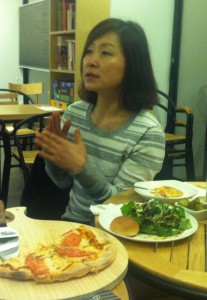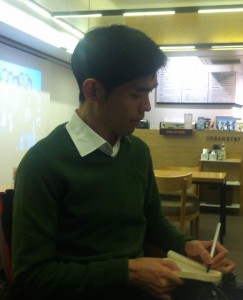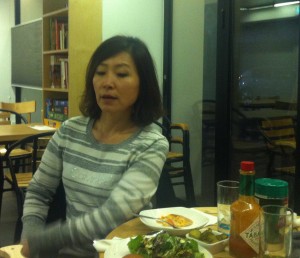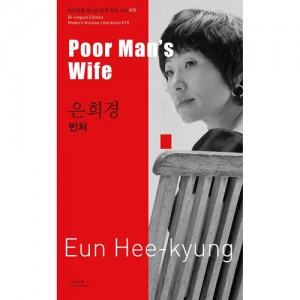 I sat down between Mangwon and Hapjeong stations at a small coffee-shop/Italian restaurant (tragically no wine), to have an interview and dinner with Korean author Eun Hee-Kyung, who has had two works translated into English, My Wife’s Boxes and Poor Man’s Wife (a title which the author revealed she is not entirely pleased). Eun is animated, quick, and forthright, and knows enough English to often use it in her answers and apparently get a decent sense of what I was saying, even before it was interpreted. In any case, I had an interpreter ready, Yoon Suhzuck, the author of It’s a Man’s Man’s Man’s World. As usual, this is not verbatim, though it was taped, as it comes through an interpreter and then me.
I sat down between Mangwon and Hapjeong stations at a small coffee-shop/Italian restaurant (tragically no wine), to have an interview and dinner with Korean author Eun Hee-Kyung, who has had two works translated into English, My Wife’s Boxes and Poor Man’s Wife (a title which the author revealed she is not entirely pleased). Eun is animated, quick, and forthright, and knows enough English to often use it in her answers and apparently get a decent sense of what I was saying, even before it was interpreted. In any case, I had an interpreter ready, Yoon Suhzuck, the author of It’s a Man’s Man’s Man’s World. As usual, this is not verbatim, though it was taped, as it comes through an interpreter and then me.
We ate, chatted about this and that, and amongst it all, managed to fit in an interview.
How did you become an author?
I lived in the country, so I could go to school two years early. At that time the administration system was not very accurate or rigid. My father, whenever he went to the urban area, he bought fairy tales for me, as gifts. So I grew up reading books, and that lead me to the dream.
When did you start writing?
When I went to school I was in the literary club and I entered in many writers contests for students and I won many of them. So everyone who knew about me and my dream thought I would be a writer, that I must be a writer someday. I a lso entered college with a literary major. But after graduating college it took me 15 years before I debuted. When I made my debut everyone wondered why it took so long?
lso entered college with a literary major. But after graduating college it took me 15 years before I debuted. When I made my debut everyone wondered why it took so long?
I answered that question. I grew up as an exemplary student. My parents expected me to be a good person, so I followed my parents’ words. I accepted life as a kind of assignment: I had to go to school, get married, get a job, get a baby. I had to achieve those assignments. While doing that I forgot about my dream.
I had to grow up in the Korean education system, which is very strict and rigid. Following the assignment, as I said, I forgot about myself. In my mid-30’s I realized that “this is not me.” I tried to think about who I was. What kind of daughter I am, what kind of wife I am, what kind of person I am as a Korean. During that process I got a one-month vacation and in the one-month vacation I wrote many short stories about who I am: As a woman, as a lover, as a daughter, all the roles. I wrote 5 short stories and submitted them to the spring contests, and one of those stories won the prize (Poor Man’s Wife was among these stories but it was A Gift From a Bird that won).
Your two stories in English are very much about the roles of women in Korea, are your works in Korean fiction based on that also?
No, wider. My work covers many issues. I did write many women’s and family stories at the beginning, but I began to write general stories based on the pain and solitude of living. I have written on various issues and one of my stories is about men in Korean society, how guys go through painful experiences through their lives, the title is Minor Leagues.
 Part of that is in “Poor Man’s Wife” in which the husband is being brutally pulled at by his work. There is the very funny scene in which the company attempts to address their damage to families by forcing the families to come in for a “family” event that is merely a chance for the company to lecture and infuriate the families.
Part of that is in “Poor Man’s Wife” in which the husband is being brutally pulled at by his work. There is the very funny scene in which the company attempts to address their damage to families by forcing the families to come in for a “family” event that is merely a chance for the company to lecture and infuriate the families.
It (Ed: Eun’s subject) is Korean society. I don’t like the title (Poor Man’s Wife). The family in the story is not poor, their relationship is broken and that is what I wanted to write about. That title does not work. My stories have been translated in many languages, but only two in English.
In these two stories in English. The narrators are uncertain – The longer you read the clearer it becomes the narrator can’t be trusted. Is this common in your work and do you do a lot of uncertain narrators (in your Korean work)?
 I like to use that format – assigning the narrator as an observer, not the main character. So the narrator is an observer. By writing this way I can write more objectively about the narrator.
I like to use that format – assigning the narrator as an observer, not the main character. So the narrator is an observer. By writing this way I can write more objectively about the narrator.
It really translates well, a lot of earlier narrators were simply narrators: ‘this happened, then that happened.’
The reason I like the format also, is I’m a woman and I wanted to view women objectively, from the outside. That is why I used the man.
I’m also interested in the fact that you have some English. So, do you work with your translators? How does that process work?
With these two works I didn’t work with the translators. I got some questions by email, but that was all. I’ve changed my ideas on this. When I went out of Korea to attend literary events I met many literary figures and heard complaints about translations and I began thinking translation might be more important than I first thought. I didn’t think me work would be read overseas, so I didn’t think about that kind of project. So I would like to intervene more in the next project.
About here, as usual, I lost my interviewing focus and we began to talk about a bunch of random things about literature that don’t bear repeating. I would just note that Eun is extremely aware of international literature and the ins and outs of literary theory and practice in general. Eun was completely engaging during this section, even buttering me up by saying that when she visited the Iowa Writers Program her English introduction was the stuff I wrote on her Wiki page and she felt it was too laudatory. I might even have blushed. But occasionally, we did get back to the script for my last two questions.
Who are your influences?
When I first started writing I read everything by Kundera. I read Patrick Modiano (this years winner for the Nobel Prize in Literature), Michel Houellebecq, also Raymond Carver.
Last official question. Which of your works would you like translated, and why?
I’d like it to be my most recent novel to be translated. The title is something like “Unattached Life.” While writing the novel I enjoyed my work because I tried many style experiments. The main character is a very cynical loser, but at the same time she reveals that she still has desires. I just enjoyed writing this.


